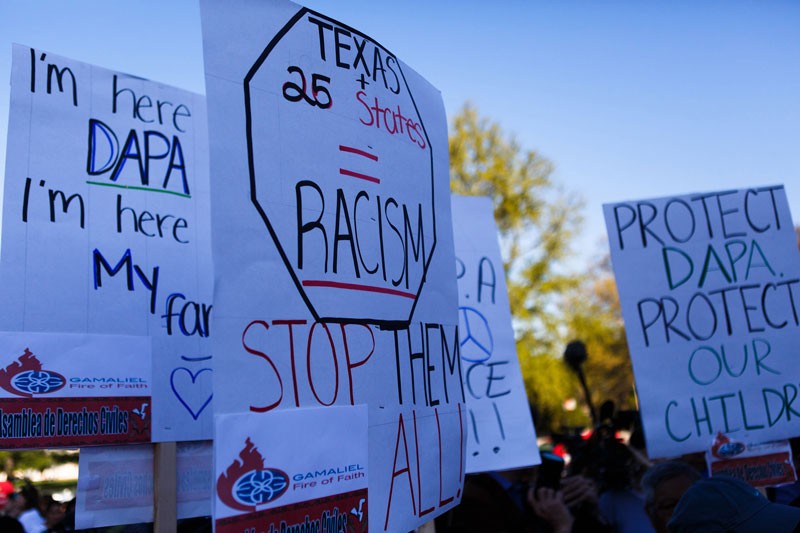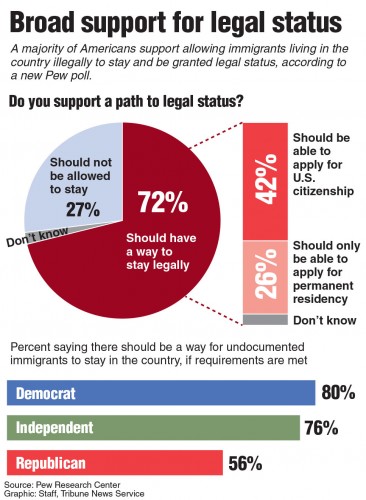
Family separation and deportation have affected DePaul senior Clarissa Clark all of her life. In 2009, the father of Clark’s 7-year-old brother was deported even before he was born, creating a gap in their family structure that hasn’t been easy to fill. Though her brother visits his father in Mexico during summer and winter vacations, Clark said it is not the same.
The Supreme Court of the United States (SCOTUS) heard the case of United States v. Texas on Monday, a lawsuit filed by 26 states to block the expansion of Deferred Action for Childhood Arrivals (DACA). This is an initiative that was first introduced in 2012, allowing children brought into the United States illegally to acquire a Social Security number, worker’s permit and driver’s license. The case also aims to halt the passing of Deferred Action for Parents of Americans and Lawful Permanent Residents (DAPA). DAPA would shield an estimated four million undocumented immigrants from deportation and allow them to work in the U.S. legally.
The court was sharply divided on the issue, making a 4-4 deadlock decision possible. In addition to proving significant in establishing presidential power, the case is a landmark decision potentially affecting immigration policy for years to come.
Professor and chair of DePaul’s Public Policy Studies department William Sampson said the case is another example of government powers trying to limit the political power of the Latino population.
“It is clear that the decision to hear the case, and the decision of the Court are both quite political,” Sampson said. “Since Latinos tend to vote Democratic, Republican governors are attempting to limit their votes by pushing for deportation. This has little to do with the phony issue of the power of the president to halt many deportations, and everything to do with limiting the political power of Latinos by limiting the number of them that will in the long run become voting citizens.”

The dismissal of DAPA would potentially allow parents of undocumented immigrants to be deported. Activists and proponents of DAPA have adopted the term “Sin papeles, sin miedo,” meaning without papers, without fear. Resilience and hope have sparked a movement for the betterment of undocumented people.
“I feel quite upset and worried about what the potential outcome might be in regards to the DACA/DAPA immigration bills,” DePaul junior Julio Garcia said. “I was fortunate enough to be born in the U.S.; however, many people fail to realize that four million undocumented immigrants are highly dependent on this bill. When speaking in regards to Latino people, it is quite disappointing that many individuals must wake up with the constant fear of being deported on a daily basis. DAPA and DACA are amazing opportunities for guardians who are coming into the U.S. to provide for their families and children who are eager to pursue their education to become someone.”
DePaul has also taken a stance of support for the federal government’s position in United V. Texas, filing an amicus brief to SCOTUS.
“The brief was circulated by the National Immigration Law Center and will be submitted on behalf of universities, colleges, school boards, student groups, educators, children’s advocates and children’s health organizations,” Vice President for Institutional Diversity and Equity Liz Ortiz said in an email.
Ortiz said the amicus brief states numerous arguments in favor of the expansion of DACA and implementation of DAPA, such as the lower courts failing to take into account effects changes in DACA would have on undocumented students and access to higher education.
After seeing first-hand the struggles undocumented students and their families face, sophomore Emely Zamudio hopes that DACA is expanded and DAPA is legitimized.
“My life has been touched by immigration in many ways. Some of the kindest, most hardworking and smartest people I know are undocumented immigrants. These people are not criminals, they are not taking advantage of the government. They are tax- paying, beneficial members to society and the U.S. economy,” Zamudio said. “As a U.S. citizen, I have never known, and will never know the fear these children and their families have felt. I am privileged in being able to live freely. I am privileged to have simply been born in the right place. Regardless of your citizenship status, you deserve the right to live without fear.”



